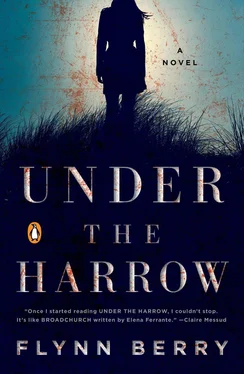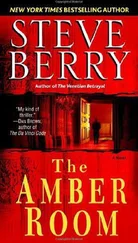I WAIT ON a bench in the corridor of the same courthouse in York. It hasn’t changed in fifteen years. Guards, solicitors, defendants, and witnesses move past me. No one asks why I am here. A transparent justice system, though the motto is in French and the judges are almost all Oxbridge. Dieu et mon droit . I only know what it means because I looked it up.
The court usher calls, “Lee Barton,” and I find a seat in the public gallery. The only other person watching the trial is a middle-aged woman. A door opens and the jury files in, already wearing that expression, fixed, remote, as though to assure us they are worthy of the responsibility.
A bailiff enters escorting the defendant. I lean forward, with a catch in my throat. It could be the man who attacked her in Snaith. Brown eyes, narrow face. I can’t gauge his height from here. He runs his eyes over the crowd, passing over me. He and the other woman in the public gallery give each other a smile. His mother, I think.
The prosecutor and the defense are both women. Both appear to be in their forties, brisk and neat. They both speak quickly, though never too quickly for the jury to understand, and with a degree of urgency. I find that I like both of them, and I wonder where they go after their trials end for the day, if they return to their offices or meet their colleagues for a drink.
I’d rather watch them, but I force myself to study Lee. He is accused of beating a woman with a tire iron. Rachel might have read about it and paid him a visit. He was released on bail until the trial and was free on the day of her murder.
The defense barrister interviews a witness, an army corporal who trained Lee. The questions are about Lee’s temper, his character, and the work he did as a private and then a border guard. “What were the dates of his service?” asks the barrister.
“He served in the Yorkshire Regiment from 1996 to 1999 and as a border guard on Tortola, BVI, from 1998 to 2000.”
He was abroad when Rachel was attacked. I slump against the bench and rub my hand over my eyes.
During the recess, I find the woman from the public gallery smoking outside. I ask for a light and introduce myself. “I’m Caitlin, Alex’s girlfriend. He had work so he asked me to come and tell him what happened.”
It always surprises me how easily the old accent comes back, as though it’s been waiting, building up, growing stronger. She nods, distracted. I can’t tell if the name was a successful guess, but if her son doesn’t know an Alex, she’s too preoccupied to challenge me.
“I didn’t know Lee was sent to the Virgin Islands,” I say. She stares across the wet traffic circle. The columns loom above us. “Did he get home much?”
“No,” she says. “Only once, for Christmas.”
After she returns inside, I stub out my cigarette and pass between the stained columns into the drizzle. On top of the courthouse is a statue of a blindfolded woman holding a sword and a pair of scales. The blindfold makes her look like she is about to be executed.
WHEN I RETURN FROM York, the journalist is at the bar in the inn. I hurry past the open door, and there is a clatter behind me as Sarah climbs off her stool and follows me into the hall.
“Glass of wine?” she asks. I start up the stairs. “Nora, I was a court reporter at the Old Bailey for eight years. I’ve watched hundreds of police inquiries move to trial. I can help you.”
I come down the stairs and follow her into the bar.
“This is off the record,” she says. “Ask me anything you like.”
“What happens to the victims’ families?”
“If it’s a child, the parents divorce. Even if the child is grown. The families often go into debt. It can be difficult to hold a job, especially at first. If it’s a spouse, the surviving partner will often remarry, and if not, he has a high risk of an early death.” She looks at me and says, “Siblings generally recover. It’s not the same as losing a child.”
“If there’s a trial, will I be able to talk to him?”
“Sort of. You can make an impact statement, but the defendant doesn’t have to respond in any way. Once he is in prison, you can visit him, if he agrees to it.”
Sarah orders a glass of wine. She wears red lipstick and a loose cowl-neck sweater. In the leather satchel hanging on a hook by her legs is a scarf with a pattern of red Japanese gates, and a black notebook.
“Keith Denton was at her house that morning.”
“I know. I’ve been looking into him,” she says. “He doesn’t have a record. Everyone I’ve spoken to here adores him.”
I signal to the bartender and order a bourbon. She’s telling the truth. If she’d found any dark secrets of his, they would be published by now.
“When will the police stop looking?”
“The Thames Valley CID says they keep an inquiry open until they stop turning up new evidence. But that’s not true, since any information about her can be considered evidence. Really they stop when they have too many new inquiries.”
“How long will that be?” There’s so little crime here, I expect it could be months, a year.
“In this district, not long. Any day now.”
“What?” There were only four murders in the county last year, I remember from the article about Rachel.
“They investigate murder, manslaughter, rape, missing persons, serious assault, and child abuse. They have more cases than you might think.”
“Would they come back to it?”
“Yes, if there’s a similar incident in the area, or if someone confesses. Or someone on the review team might pick it up, but there are hundreds of other cases for them to consider.” We sit in silence, and she straightens the links on her bracelet. “Can I ask you something?” she says.
I nod, though she seems far away, and the bar seems far away. Any day now. Then I notice Sarah’s expression. She’s going to tell me who she thinks did it.
“Where’s the dog?” she asks.
“What?”
“A lot of people in town have mentioned seeing Rachel with a dog. Where is he?”
“He ran away.”
She nods and sips her wine. “When?”
“The day Rachel was killed. Whoever did it must have left the door open and the dog escaped.”
German shepherds do not run away. Sarah doesn’t say this, and she tries not to look triumphant, but she is getting closer to whatever it is she needs. I can’t tell you what it will be like, Moretti said, if this becomes a national story.
I TAKE MYSELF TO the Miller’s Arms for breakfast. I only pretended to Rachel that I liked the Duck and Cover better. I order the Parmesan galette and a coffee and argue with Rachel in my head. I don’t want a sausage bap and instant coffee, I tell her. You’re skint, she would say, that is what skint people eat.
“Social climber,” she said when I was eighteen and losing my Yorkshire accent, and I was, but I also needed a change. That summer, our dad lost the plot, and by the time I got to university I was furious, and I changed my voice the way I would have chewed off my leg to get out of a trap. Every time I heard my cool, even accent, I thought — I’ve left, I’m gone.
It wasn’t difficult. Most of the people I went to university with spoke in the almost placeless tones of Received Pronunciation. Rachel kept her accent even after she moved south, but she had a beautiful voice, burry and low.
I try not to think about my conversation with the journalist, but I regret all of what I said to her. If I weighed my actions further in the past, the regret might kill me.
I told Rachel I would be on an earlier train. After my job, I was supposed to catch the 1:50 train from Paddington. Instead I left London at 2:50. In that hour, I ate lunch at the Surprise. I had salmon in pastry and a white wine. The thought of the food and drink repulses me. At the time I thought it was decadent.
Читать дальше












